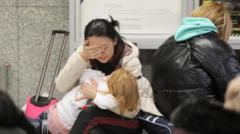Svitlana, a 31-year-old Ukrainian mother, recounted her daughter’s experience at school, where she once thrived. “Even when we moved to another area, she didn't want to change schools,” Svitlana said. However, a recent incident marked a disturbing shift in atmosphere: “One boy said to me today, ‘Go back to Ukraine.’” This sentiment resonates with many Ukrainians living in Poland, where increased incidents of verbal abuse and online xenophobia have been reported in recent months.
As of now, over 2.5 million Ukrainians reside in Poland, accounting for nearly 7% of the country's total population. During the initial stages of the Ukrainian crisis, Poles extended remarkable support to refugees, facilitating humanitarian efforts and offering accommodations. However, as the ongoing war continues, Svitlana observes a change in sentiments towards her community. “At work, people say Ukrainians come here and behave badly,” she lamented, expressing her fear that many of her friends are contemplating a return to Ukraine due to rising hostility.
Activist Natalia Panchenko heads the 'Stand with Ukraine' Foundation and has spotlighted how online abuse has spilled into real life. “Recently, we have more and more of these kinds of situations… xenophobic abuse in shops or hotels,” she said. Research indicates this trend, as support for Ukrainian refugees among Poles has waned, dropping to 50% according to a March 2025 poll, compared to 81% two years ago.
The backdrop of a crucial presidential election has intensified these shifting dynamics. In the run-up to the election, candidates are re-evaluating their stances on Ukraine to align with evolving public sentiments. The far-right candidate, Slawomir Mentzen, openly expresses anti-Ukrainian views, affecting the political discourse. Meanwhile, Rafal Trzaskowski, the front-runner who has generally been pro-Ukrainian, is now downplaying this stance to attract centrist voters in response to the changing public mood.
Disinformation campaigns have also played a significant role in escalating anti-Ukrainian attitudes. NGO leader Michal Marek emphasized that narratives suggesting Ukrainians are taking advantage of Polish resources, among other accusations, have gained traction. “This information starts in Russian-speaking Telegram channels and then spreads,” Marek noted, linking these narratives to a tangible rise in hostility towards Ukrainians.
As the tensions rise, the Polish government has warned of Russian interference in the election, suggesting an organized effort to spread disinformation against Ukrainians. While initial acts of solidarity abound, the situation for Ukrainian refugees in Poland continues to change rapidly, prompting fears for their safety and acceptance within their host nation.
As of now, over 2.5 million Ukrainians reside in Poland, accounting for nearly 7% of the country's total population. During the initial stages of the Ukrainian crisis, Poles extended remarkable support to refugees, facilitating humanitarian efforts and offering accommodations. However, as the ongoing war continues, Svitlana observes a change in sentiments towards her community. “At work, people say Ukrainians come here and behave badly,” she lamented, expressing her fear that many of her friends are contemplating a return to Ukraine due to rising hostility.
Activist Natalia Panchenko heads the 'Stand with Ukraine' Foundation and has spotlighted how online abuse has spilled into real life. “Recently, we have more and more of these kinds of situations… xenophobic abuse in shops or hotels,” she said. Research indicates this trend, as support for Ukrainian refugees among Poles has waned, dropping to 50% according to a March 2025 poll, compared to 81% two years ago.
The backdrop of a crucial presidential election has intensified these shifting dynamics. In the run-up to the election, candidates are re-evaluating their stances on Ukraine to align with evolving public sentiments. The far-right candidate, Slawomir Mentzen, openly expresses anti-Ukrainian views, affecting the political discourse. Meanwhile, Rafal Trzaskowski, the front-runner who has generally been pro-Ukrainian, is now downplaying this stance to attract centrist voters in response to the changing public mood.
Disinformation campaigns have also played a significant role in escalating anti-Ukrainian attitudes. NGO leader Michal Marek emphasized that narratives suggesting Ukrainians are taking advantage of Polish resources, among other accusations, have gained traction. “This information starts in Russian-speaking Telegram channels and then spreads,” Marek noted, linking these narratives to a tangible rise in hostility towards Ukrainians.
As the tensions rise, the Polish government has warned of Russian interference in the election, suggesting an organized effort to spread disinformation against Ukrainians. While initial acts of solidarity abound, the situation for Ukrainian refugees in Poland continues to change rapidly, prompting fears for their safety and acceptance within their host nation.


















